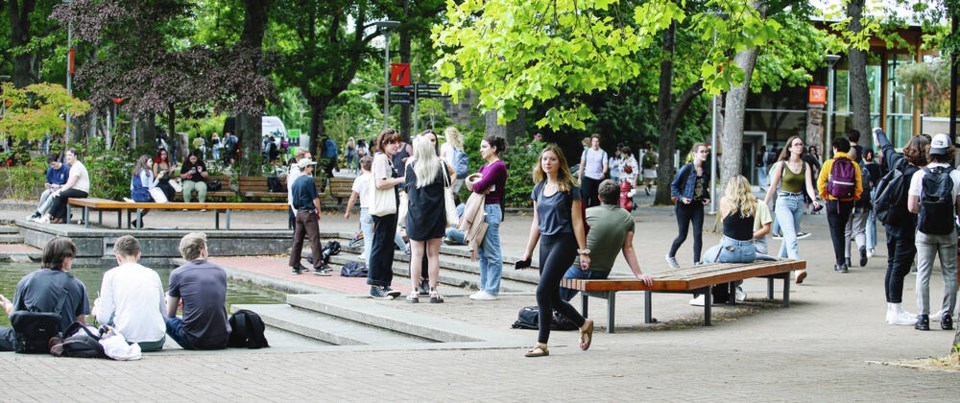Provincial health officer Bonnie Henry emphasized earlier this year the importance of sa���ʴ�ý’s universities and colleges returning to in-person classes due to the pandemic’s impacts on students.
Camosun College, the University of Victoria, Vancouver Island University and Royal Roads University are now all back to delivering in-person courses on campus.
Each institution has approached the return to campus in its own way. For example, UVic continues to offer about 100 courses online this fall for students unable to be on campus due to pandemic-related challenges. These are in addition to the courses that were already being taught online before the pandemic.
The pandemic closures early last year forced universities across sa���ʴ�ý to shift abruptly to online-only delivery. For those teaching the courses, that meant moving live lectures and exams online. Others emailed students the remaining course content or posted slides, lecture notes or prerecorded lectures online.
Summer 2020 was a repeat of that.
Students were understandably unhappy. Some took 2020-21 off. Pandemic university was not what they had signed up for.
The post-secondary experience is supposed to be more than just taking classes and maintaining a certain grade point average. Yes, learning academic information and technical skills is important.
But it’s also about making friends, trying experiences, stretching and growing, having fun and learning how to successfully navigate independence and young adulthood.
With so many students living back at home with mom and pop, much of that became more difficult, if not impossible.
In addition, many students reported feeling lost and unsupported in the new, less-structured delivery environment. Many found the time and effort required for each course increased considerably. The sudden increased responsibility for managing their own time, self-monitoring, meeting course objectives and goals, and so on, would have been trying even without the stress and uncertainty of the pandemic itself.
As a result, surveys revealed that students’ reported mental health suffered, on average, more than that of other people.
Many Canadian universities offered compassionate grading — pass/fail, satisfactory/unsatisfactory — in place of marks to measure student success under enforced online learning to ease the stress.
But some students apparently benefited under the new online-delivery model. One university-employed friend, who shall remain nameless, tells me that some students her office works with were barely passing their classes before the pandemic but began achieving near-perfect marks after classes and exams moved online.
“Why would that be?” I asked.
She shrugged. “No comment.”
It could have been that they had unsanctioned help with assignments and exams. During the pandemic shutdown, reports and anecdotal accounts of cheating by students on exams increased.
In one case at a Canadian university, 20 minutes into an hour-long online exam, all the answers to the test’s questions were posted and made available online. Use of services offered by companies and essay mills that ghostwrite papers, exams, lab reports and other course deliverables for students was also reported to have increased globally.
However, to give suddenly excelling students the benefit of the doubt, it could also have been that their grades improved because these young people were finally focusing on their schoolwork.
Living back at home meant the endless distractions that come with living in student residences were suspended. Evenings out with friends, ski trips and other socially based disruptions were curtailed.
And with the public health orders shuttering nonessential businesses for months, the demands of part-time jobs would no longer have diverted students from their academic responsibilities. In addition, maybe these students were for once getting the sleep they needed during the hours they needed it. Studies show that improved sleep quality leads to improved learning (provided you don’t oversleep).
Other research shows that adolescents and adults in their early 20s often tend toward sleep-waking rhythms that favour staying up later at night and sleeping later in the morning. With no commute to school, sleeping later would have been an option.
Now that many courses are back to being delivered on campus and something resembling the typical student campus experience has returned, the reasons behind the shift in grades may emerge.
Or perhaps pre-pandemic performance patterns will return.



